Vorteile von Bambusgewebe
Komfort–Bambusfasern haben eine runde, glatte Struktur, die sich in einem wunderbar weichen, glatten Stoff niederschlägt. Das macht sie zu einer der bequemsten Optionen für die Schlafenszeit und hat dazu geführt, dass Bambusbettwäsche in den letzten Jahren immer beliebter geworden ist. Ein besonderer Vorteil von Bambusgewebe ist, dass es mit jeder Wäsche weicher wird und somit eine hervorragende Investition für langfristigen Komfort darstellt.
Atmungsaktivität– Einer der Hauptvorteile von Bambus ist seine außergewöhnliche Atmungsaktivität. Dadurch wirkt er der natürlichen Retention von Memory-Schaum, der für Matratzen und Kissen verwendet wird, auf einzigartige Weise entgegen und inspirierte den innovativen BioCell Foam™, der in unseren Bambus-Hybridmatratzen verwendet wird.
Natürlich antibakteriell– Bambusgewebe behält einige wunderbare natürliche Eigenschaften, beispielsweise antibakterielle Eigenschaften, die zu einem hygienischen Schlaf beitragen. Es eignet sich auch ideal für die Herstellung von Haushaltswaren und Kinderprodukten wie Babymusselin, der bei Gebrauch viele Bakterien anziehen kann.
Thermoregulierend– Die natürliche thermoregulierende Eigenschaft von Bambus sorgt dafür, dass die Körpertemperatur reguliert wird, was ihn zu jeder Jahreszeit zu einem beliebten Material macht. Von gemütlichen Wintern bis hin zu warmen Sommern sorgt Bambus für ein angenehmes Tragegefühl.
Hypoallergen– Allergiker und Menschen mit empfindlicher Haut lieben das sanfte Gleiten des Bambusgewebes über die Haut. Die Pflanze ist von Natur aus hypoallergen,Das bedeutet, dass es aktiv vor Allergien schützt und Sie kühl und frei von Reizungen hält.
Vorteile von Baumwollgewebe
Komfort– ägyptische Baumwolle gilt oft als eine der bequemsten Optionen für die Schlafenszeit, da ihre luxuriöse (aber teure) Fadendichte ein extravaganter Luxus ist. Baumwollfasern sind etwas gröber als Bambusfasern, wodurch der Stoff sich etwas frischer anfühlt.
Haltbarkeit– Obwohl die Farbe von Baumwollbettwäsche und anderen Produkten verblassen kann, ist der Stoff unglaublich strapazierfähig und kann jahrelang halten.
Saugfähig– Baumwollgewebe ist wunderbar saugfähig und eignet sich daher hervorragend für Handtücher und bestimmte Haushaltsprodukte. Bambus ist jedoch dreimal saugfähiger als Baumwollgewebe!
Was ist umweltfreundlicher?
Welcher Stoff ist umweltfreundlicher, wenn es um die beste Wahl für den Planeten geht? Bambus ist hier wahrscheinlich der Gewinner. Bambus benötigt zum Wachsen ein Drittel weniger Wasser als Baumwolle, und er wächst unglaublich – bis zu 1,20 Meter pro Tag, was ihn zu einer der nachhaltigsten Ressourcen der Welt macht. Baumwolle benötigt bei der Ernte deutlich mehr Pestizide und Düngemittel. Obwohl beide Stoffe langlebig und somit eine gute langfristige Investition sind, scheint Bambus bei einer ganzheitlichen Betrachtung der Produktionsprozesse die ethischere Wahl zu sein. Bambus wird mit faireren Arbeitsbedingungen und fortschrittlicheren, umweltfreundlicheren Herstellungsverfahren in Verbindung gebracht.
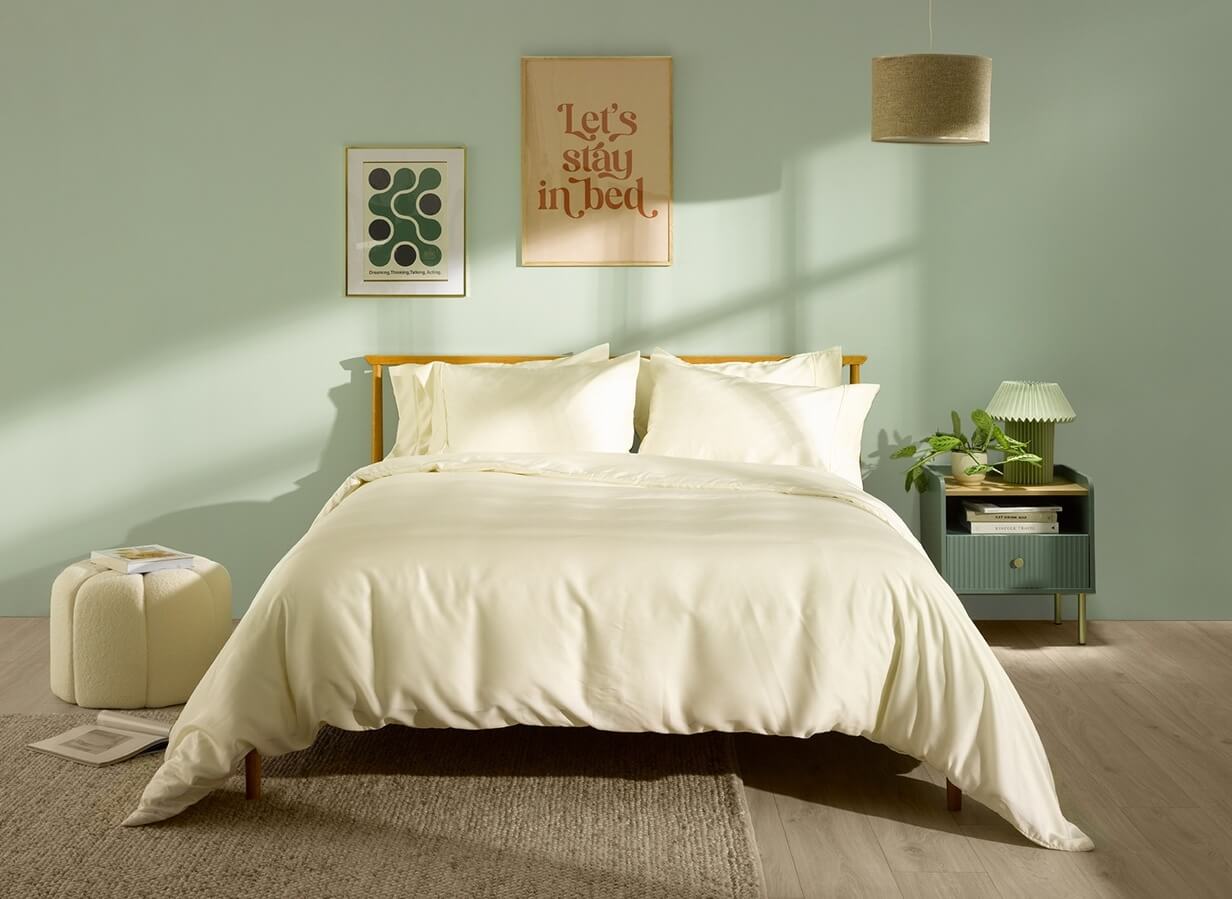

![[MattressTopper] Panda London Memory Foam Bamboo Mattress Topper package box](http://pandalondon.com/cdn/shop/files/Bamboo_Mattress_Topper_Package_Box.webp?v=1742301823&width=1500)
![[MattressTopper] Panda London Memory Foam Bamboo Mattress Topper on the floor](http://pandalondon.com/cdn/shop/products/Panda-Memory-Foam-Bamboo-Mattress-Topper-Yoga-e1624045454555.jpg?v=1758795458&width=1000)
![[MattressTopper] Bamboo Mattress Topper Lifestyle Image with Memory Foam Pillows Product Page](http://pandalondon.com/cdn/shop/files/Bamboo_Mattress_Topper_Lifestyle_Image_with_Memory_Foam_Pillows_Product_Page.webp?v=1758795458&width=800)
![[MattressTopper] Bamboo Mattress Topper Lifestyle Image with Bamboo Pillows In the Garden room Product Page](http://pandalondon.com/cdn/shop/files/Bamboo_Mattress_Topper_Lifestyle_Image_with_Bamboo_Pillows_In_the_Garden_room_Product_Page.webp?v=1758795458&width=800)
![[MattressTopper] Panda London Memory Foam Bamboo Mattress Topper side](http://pandalondon.com/cdn/shop/files/Mattress_Topper_Isolated_-_resized.jpg?v=1758795458&width=800)
![[HybridMattressPro] Hybrid_Bamboo_Mattress_Pro_Product_Image_2026](http://pandalondon.com/cdn/shop/files/Hybrid_Bamboo_Mattress_Pro_Product_Image_2026.webp?v=1764944771&width=1000)
![[HybridMattressPro] Breathable Hybrid Bamboo Mattress](http://pandalondon.com/cdn/shop/products/Breathable-Hybrid-Bamboo-Mattress.jpg?v=1764944771&width=1920)
![[HybridMattressPro] Hybrid Bamboo Mattress Pro Cover Zip](http://pandalondon.com/cdn/shop/files/Hybrid_Bamboo_Mattress_Cover.jpg?v=1764944771&width=800)
![[HybridMattressPro] Panda Hybrid Bamboo Mattress Pro](http://pandalondon.com/cdn/shop/files/Hybrid_Bambo_Memory_Foam_Mattress_-_BioCell_Foam_x.jpg?v=1764944771&width=800)
![[HybridMattressPro] Couple on a Hybrid Bamboo Mattress Pro](http://pandalondon.com/cdn/shop/files/Hybrid_Bamboo_Mattress_Couple.jpg?v=1764944771&width=800)
![[CloudDuvet] Panda London The Cloud Bamboo Duvet Packaging](http://pandalondon.com/cdn/shop/products/Panda-London-The-Cloud-Bamboo-Duvet-Panda-Life-scaled_00a651ad-4ca3-4105-b520-12a94c1a4f71.jpg?v=1713363286&width=1920)
![[CloudDuvet] Panda London The Cloud Bamboo Duvet Rolled](http://pandalondon.com/cdn/shop/products/Duvet-Listing-Images03.jpg?v=1764079307&width=1000)
![[CloudDuvet] Panda London The Cloud Bamboo Duvet Girl Huggin a Duvet on the Bed](http://pandalondon.com/cdn/shop/files/Cloud_Bamboo_Duvet_-_Lady_Hugging_it_on_Bed_LifestyleImage.jpg?v=1764079307&width=1000)
![[CloudDuvet] Panda London The Cloud Bamboo Duvet Guy In the Air with Cloud Bamboo Duvet](http://pandalondon.com/cdn/shop/files/GuyonaHybridBambooMattresswithCloudDuvet.jpg?v=1764079307&width=2000)
![[CloudDuvet] Panda Cloud Duvet Winter on the bed lifestyle image](http://pandalondon.com/cdn/shop/files/Panda_Cloud_Duvet_Winter_on_the_Bed_Lifestyle-1_image.jpg?v=1764079307&width=1000)
![[BBWhite] White 100% Bamboo Bedding](http://pandalondon.com/cdn/shop/files/Pure_White_Full_Bed.webp?v=1719581797&width=1000)
![[BBWhite] White 100% Bamboo Bedding Texture](http://pandalondon.com/cdn/shop/files/100_Bamboo_Bedding_-_Pure_White_-_Close_Up_02.webp?v=1762879591&width=1000)
![[BBWhite] White 100% Bamboo Bedding Woman in bed sleeping](http://pandalondon.com/cdn/shop/files/100-Bamboo-Bedding-Set-Pure-White-BB.webp?v=1762879591&width=768)
![[BBWhite] White 100% Bamboo Bedding Woman Duvet cover buttons](http://pandalondon.com/cdn/shop/files/hand_and_buttons_1.webp?v=1762879591&width=1000)
![[BBWhite] White 100% Bamboo Bedding Woman in bed looking and smiling-](http://pandalondon.com/cdn/shop/files/SatonMadeBed-White100_BambooBedding-white_-_BB_SideShot1000x1000.webp?v=1762879591&width=980)
![[BBUrbanGrey] Urban Grey 100% Bamboo Bedding](http://pandalondon.com/cdn/shop/files/Made_Bed_-_Urban_Grey_-_Wide_Shot_2_1_1.webp?v=1762880019&width=1000)
![[BBUrbanGrey] Cloud Duvet Urban Grey 100% Bamboo Bedding Set](http://pandalondon.com/cdn/shop/files/Cloud_Duvet_-_Grey_-_Close_up_2.webp?v=1762880019&width=1000)
![[BBUrbanGrey] Urban Grey 100% Bamboo Bedding Set Woman sitting on the bed](http://pandalondon.com/cdn/shop/files/Sat_in_Bed_-_Grey_100__Bamboo_Bedding_-_Wide_Shot.webp?v=1762880019&width=1000)
![[BBUrbanGrey] Urban Grey 100% Bamboo Bedding Set Woman Duvet buttons Panda London](http://pandalondon.com/cdn/shop/files/hand_buttons_grey_bedding_1.webp?v=1762880019&width=1000)
![[BBUrbanGrey] Woman Sitting on the Bamboo Bedding with coffee](http://pandalondon.com/cdn/shop/files/SatonMadeBed-White100_BambooBedding-SideShot1000x1000.jpg?v=1762880019&width=1000)
![[BBNavyBlue] Deep Sea Navy Blue 100% Bamboo Bedding](http://pandalondon.com/cdn/shop/files/Made_Bed_-_Navy_-_Wide_Shot_3_copy.webp?v=1762879591&width=1000)
![[BBNavyBlue] Deep Sea Navy Blue 100% Bamboo Bedding Texture](http://pandalondon.com/cdn/shop/files/Cloud_Duvet_-_Navy_-_Close_up_2.webp?v=1762880019&width=1000)
![[BBNavyBlue] Deep Sea Navy Blue 100% Bamboo Bedding Woman Sitting on the bed](http://pandalondon.com/cdn/shop/files/Sat_Up_in_Bed_-_Navy_100__Bamboo_Bedding_-_Hands_on_Bed.webp?v=1762880019&width=1000)
![[BBNavyBlue] Deep Sea Navy Blue 100% Bamboo Bedding Duvet Cover Buttons](http://pandalondon.com/cdn/shop/files/Cloud_Duvet_Cover_Buttons_-_Deep_Sea_Navy.webp?v=1762880019&width=1000)
![[BBNavyBlue] Deep Sea Navy Blue 100% Bamboo Bedding Woman sitting on the bed looking away](http://pandalondon.com/cdn/shop/files/SatonMadeBed-White100_BambooBedding-SideShot1000x1000-001.webp?v=1762880019&width=980)
![[BBPink] Vintage Pink Blue 100% Bamboo Bedding](http://pandalondon.com/cdn/shop/files/Made_Bed_-_Pink_-_Wide_Shot_copy.webp?v=1762879591&width=1000)
![[BBPink] Vintage Pink Texture 100% Bamboo Bedding](http://pandalondon.com/cdn/shop/files/Cloud_Duvet_-_Pink_-_Close_up_2.webp?v=1762880019&width=1000)
![[BBPink] Vintage Pink Woman Sitting on the 100% Bamboo Bedding](http://pandalondon.com/cdn/shop/files/Sat_Up_in_Bed_-_Pink_-_Hands_on_Bed.webp?v=1762880019&width=1000)
![[BBPink] Vintage Pink Woman Sitting on the 100% Bamboo Bedding Duvet Cover](http://pandalondon.com/cdn/shop/files/Cloud_Duvet_Cover_Buttons_-_Vintage_Pink.webp?v=1762880019&width=1000)
![[BBPink] Vintage Pink Woman Sitting on the 100% Bamboo Bedding Woman looking far away](http://pandalondon.com/cdn/shop/files/SatonMadeBed-White100_BambooBedding-SideShot1000x1000-001_Vintage_Pink.webp?v=1762880019&width=980)
![[BBGrey] Light Grey 100% Bamboo Bedding](http://pandalondon.com/cdn/shop/files/Made_Bedding_in_Bedroom_-_Urban_Grey_-_Wide_Shot.webp?v=1762879591&width=1000)
![[BBGrey] Light Grey 100% Bamboo Bedding texture](http://pandalondon.com/cdn/shop/files/Texture17.webp?v=1762880019&width=1000)
![[BBGrey] Light Grey 100% Bamboo Bedding with Woman smiling](http://pandalondon.com/cdn/shop/files/Sat_Up_in_Bed_-_Grey_-_Hands_on_Bed.webp?v=1762880019&width=1000)
![[BBGrey] Light Grey 100% Bamboo Bedding with Duvet Cover buttons](http://pandalondon.com/cdn/shop/files/Cloud_Duvet_Cover_Buttons_-_Quiet_Grey.webp?v=1762880019&width=1000)
![[BBGrey] Light Grey 100% Bamboo Bedding with Woman smiling and sitting coffee](http://pandalondon.com/cdn/shop/files/SatonMadeBed-White100_BambooBedding-SideShot1000x1000-002-_Grey.webp?v=1762880019&width=980)
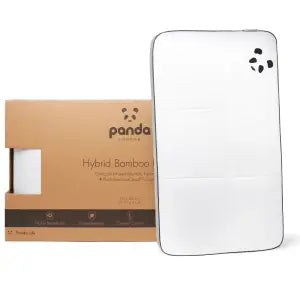 Hybrid Bambuskissen
Hybrid Bambuskissen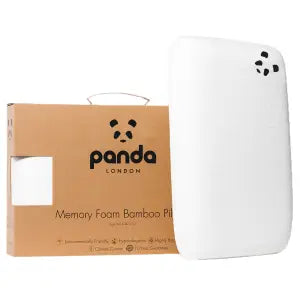 Memory Foam Bambuskissen
Memory Foam Bambuskissen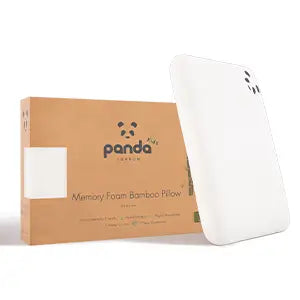 Memory Foam Bambuskissen für Kinder
Memory Foam Bambuskissen für Kinder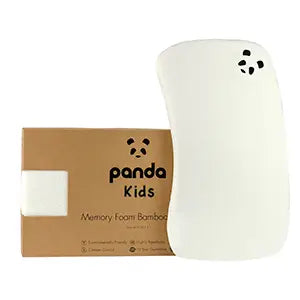 Baby Memory Foam Bambuskissen
Baby Memory Foam Bambuskissen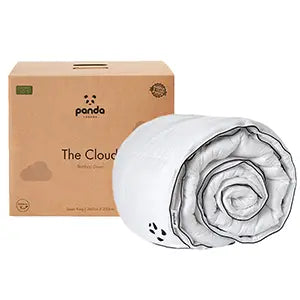 Panda Bettdecke Cloud
Panda Bettdecke Cloud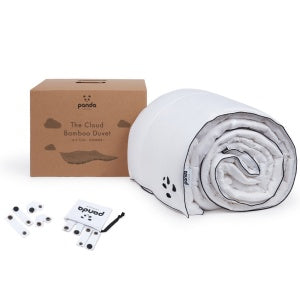 Sommerbettdecke aus Bambus
Sommerbettdecke aus Bambus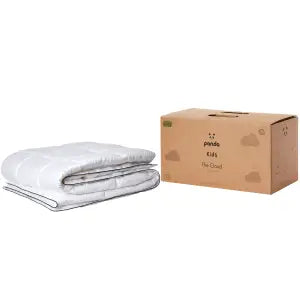 Kinder Cloud Bettdecke
Kinder Cloud Bettdecke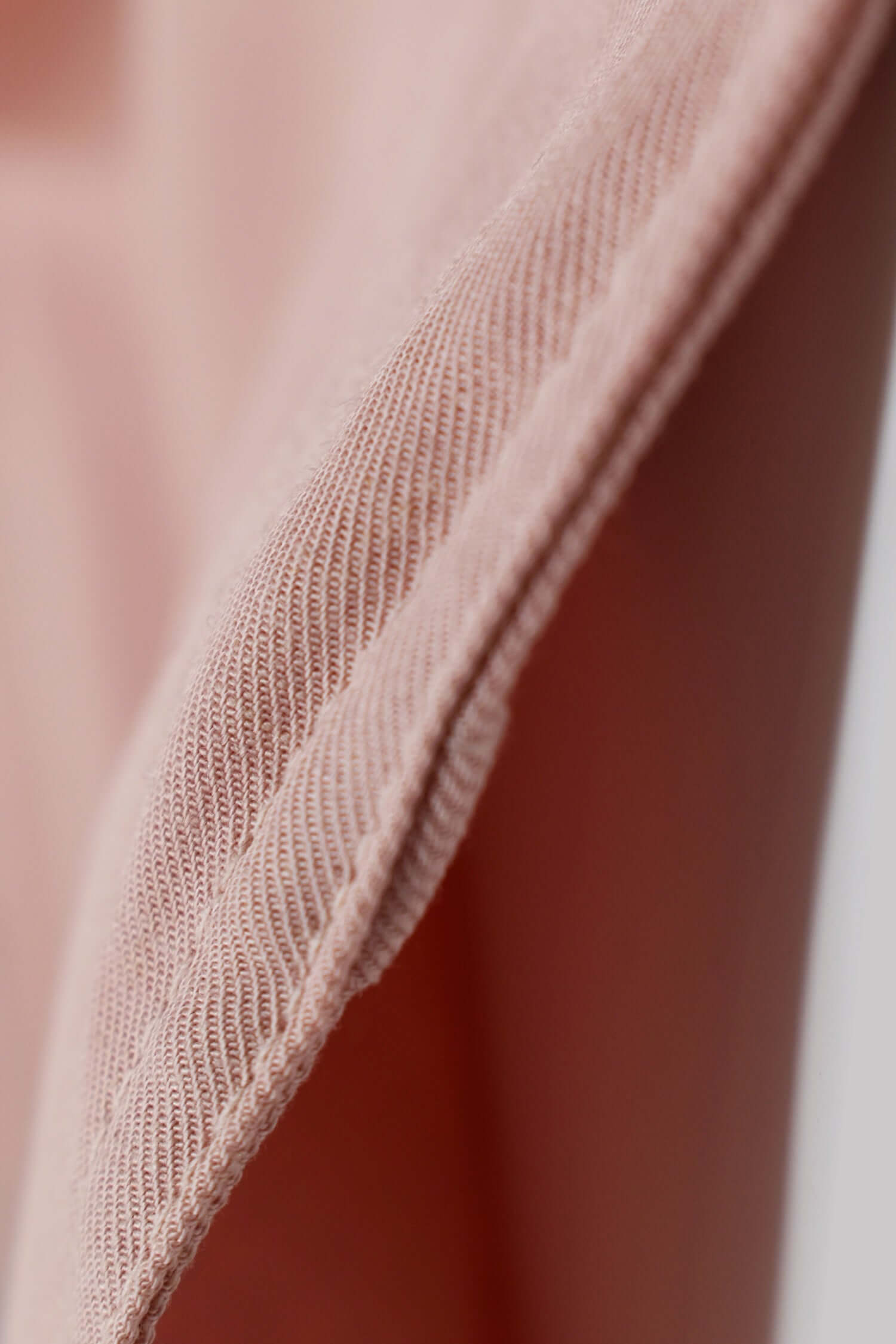

![[ForestGreen] Panda London Bamboo Lyocell Bedding Set Package](http://pandalondon.com/cdn/shop/files/Bamboo_Lyocell_Bedding_Set_Package.jpg?v=1713800411&width=768)
![[ForestGreen] Panda London Bamboo Lyocell Texture](http://pandalondon.com/cdn/shop/files/Green-Texture.jpg?v=1713800527&width=768)
![[ForestGreen] Bamboo Lyocell Green Corner Panda London](http://pandalondon.com/cdn/shop/files/GreenPCCorner.jpg?v=1713800525&width=768)
![[ForestGreen] Bamboo Lyocell Green Buttons Panda London](http://pandalondon.com/cdn/shop/files/BambooLyocellButtonsGreen.jpg?v=1713800525&width=768)
![[ForestGreen] Panda London Bamboo Lyocell Green Fitted Sheet](http://pandalondon.com/cdn/shop/files/Green_Fitted_Sheet.jpg?v=1713800503&width=768)
![[ForestGreen] Panda London Complete Bamboo Lyocell Bedding Set](http://pandalondon.com/cdn/shop/files/GreenBedding-FullSet.jpg?v=1713800527&width=768)
![[Cream] Panda London Bamboo Lyocell Full Bedding Set](http://pandalondon.com/cdn/shop/files/Bamboo_Lyocell_Bedding_Set_Package_Cream.jpg?v=1713800626&width=768)
![[Cream] Panda London Bamboo Lyocell Cream Texture](http://pandalondon.com/cdn/shop/files/PebbleCream-Texture.jpg?v=1713800973&width=768)
![[Cream] Panda London Bamboo Lyocell Full Bedding Set Cream Corner](http://pandalondon.com/cdn/shop/files/PebbleCreamPCCorner.jpg?v=1713800973&width=768)
![[Cream] Panda London Bamboo Lyocell Full Bedding Panda Bamboo button](http://pandalondon.com/cdn/shop/files/PebbleCreamButton.jpg?v=1713800973&width=768)
![[Cream] Panda London Bamboo Lyocell Full Bedding Fitted Sheet](http://pandalondon.com/cdn/shop/files/PebbleCreamFittedSheet.jpg?v=1713800973&width=768)
![[Cream] Panda London Bamboo Lyocell Full Bedding Set Lifestyle Image](http://pandalondon.com/cdn/shop/files/PebbleCreamBedding-FullSet.jpg?v=1713800973&width=768)
![[GreyEyeMask] Panda London Bamboo Grey Eye Mask](http://pandalondon.com/cdn/shop/files/Grey_Eye_Mask_01.jpg?v=1718269260&width=1000)
![[GreyEyeMask] Panda London Bamboo Grey Eye Mask Full](http://pandalondon.com/cdn/shop/files/Grey_Eye_Mask_02.jpg?v=1718269260&width=1000)
![[GreyEyeMask] Panda London Bamboo Grey Eye Mask Package](http://pandalondon.com/cdn/shop/files/Grey_Eye_Mask_03.jpg?v=1718269259&width=1000)
![[BlackEyeMask] Panda London Bamboo Black Eye Mask Package](http://pandalondon.com/cdn/shop/files/Black_Eye_Mask_01.jpg?v=1718269260&width=870)
![[BlackEyeMask] Panda London Bamboo Black Eye Mask Full](http://pandalondon.com/cdn/shop/files/Black_Eye_Mask_02.jpg?v=1718269259&width=1000)
![[BlackEyeMask] Panda London Bamboo Black Eye Mask Full Package](http://pandalondon.com/cdn/shop/files/Black_Eye_Mask_03.jpg?v=1718269259&width=1000)
![[VintagePink] Pink_Eye_Mask_01](http://pandalondon.com/cdn/shop/files/Pink_Eye_Mask_01.jpg?v=1718269259&width=909)
![[VintagePink] vintage-pink Panda London Bamboo Eye mask](http://pandalondon.com/cdn/shop/files/Pink_Eye_Mask_02.jpg?v=1718269260&width=1000)
![[VintagePink] vintage-pink Panda London Bamboo Eye mask Package Full](http://pandalondon.com/cdn/shop/files/Pink_Eye_Mask_03.jpg?v=1718269259&width=1000)
![[all] Topper Cover Listed Panda London](http://pandalondon.com/cdn/shop/products/Topper-Cover-Listing_isolated-01.png?v=1711732989&width=2520)
